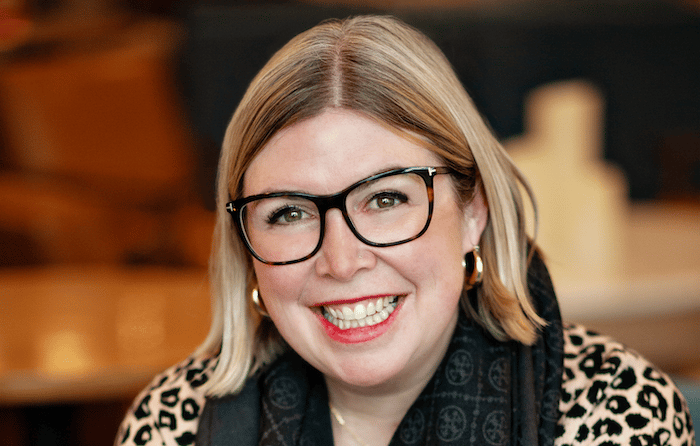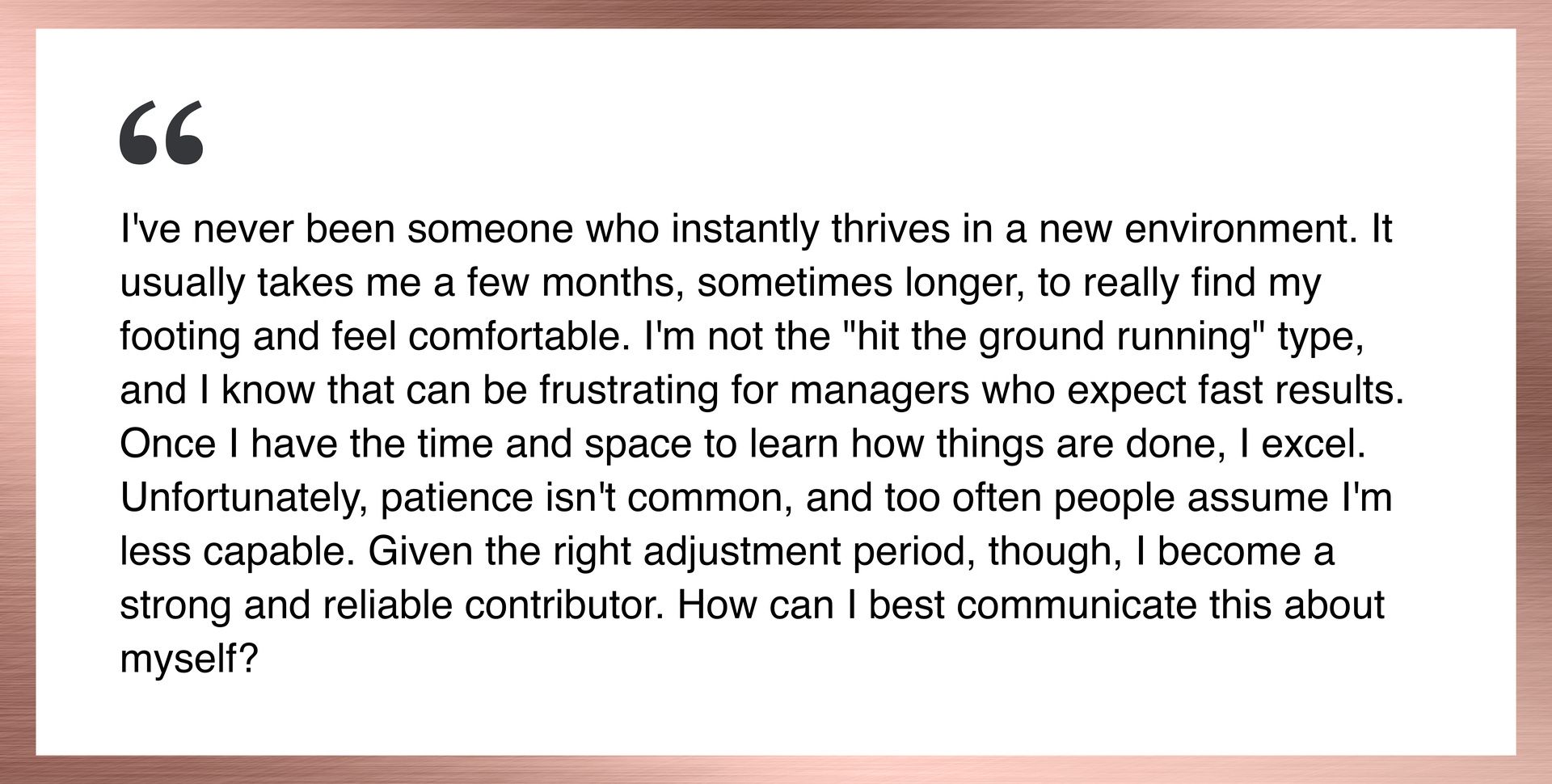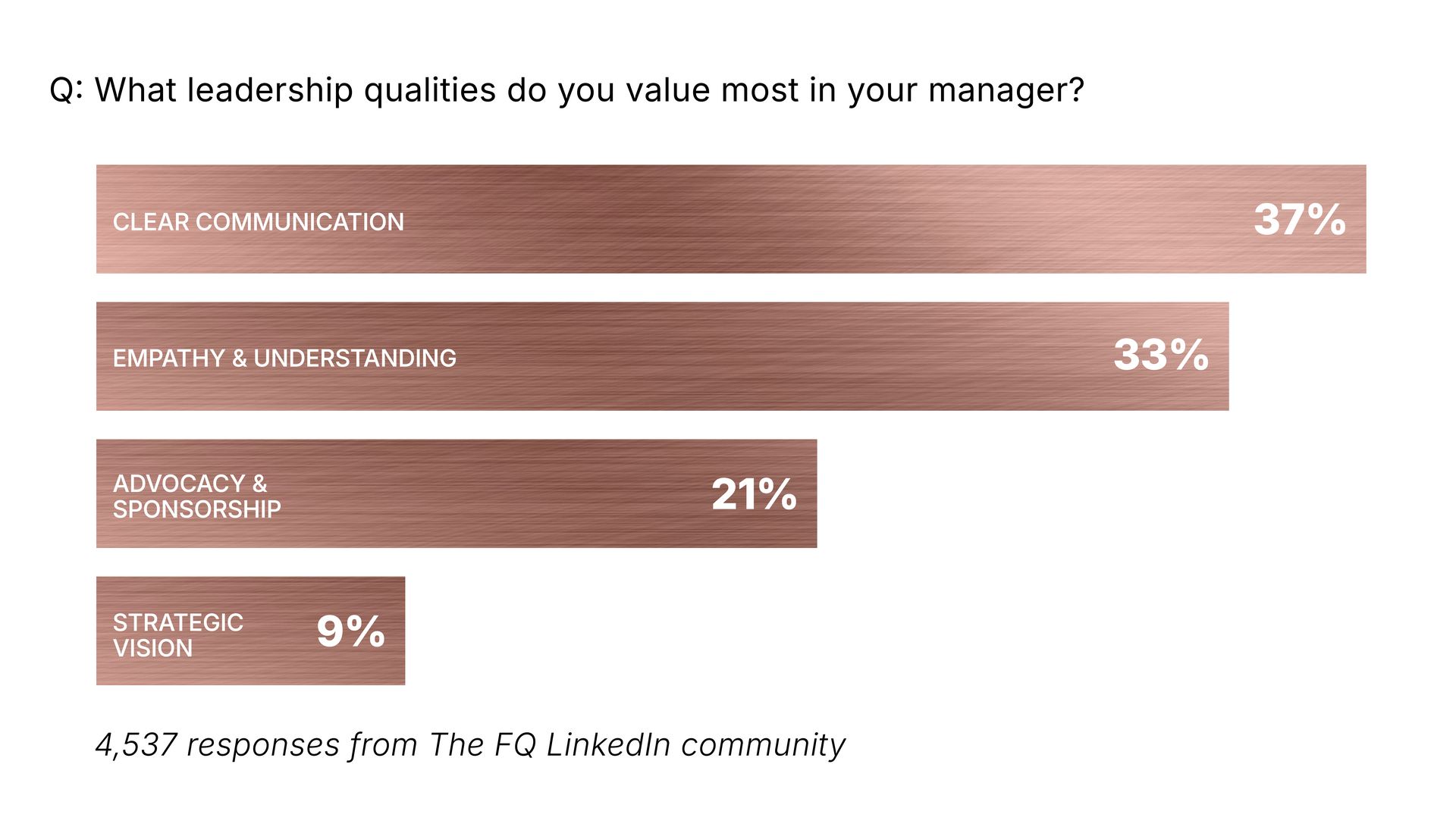Forward this to your work bestie
They’ll be glad you did

WHAT’S ON DECK
Tell Me More: What’s the key to work satisfaction and growth? It’s not what you think.
Troublemaker Spotlight: Dr. Christy Lane, Co-Founder, Flora Fertility
Dear FQ: I’m worried my “slow start” will always hold me back
Poll the Pack: We want leaders to have our backs
TELL ME MORE
Having a best friend at work isn’t just fun, it’s the key to work satisfaction and career growth

It’s 2pm on a long, meeting-filled day. Suddenly, your Slack lights up. It’s your work bestie checking in. And before you know it, you’re doubled over with laughter.
We all know that moment of connection in a sea of back-to-back calls can be a lifesaver. Research is proving that these close work friendships don’t just make our workday better, they actually make us better at our work. Turns out the impact goes beyond happy hours and inside jokes. Workplace friendships are proven to drive business outcomes too: Think stronger performance and higher retention. Win-win. And that promotion? Chances are your work bestie helped you get there by cheering you on, giving honest feedback, and pushing you to grow.
According to Gallup, employees with a best friend at work are seven times more likely to be fully engaged. Those moments of spontaneous fun and infusions of BFF energy translate directly to how we handle challenges. We’re up for it, we’re ready, we’ve got a workplace wing woman, and we feel it. Employers are seeing improved profitability, safety, and retention. But that’s just the icing.
The cake:
83% of professionals say work friendships help them feel more engaged.
81% report higher job satisfaction.
76% of employees with close friends at work are far more likely to stay with their current company.
Yet even as 87% of employees say close work friendships are "very important," only 20% of U.S. employees actually report having a best friend at work. We're collectively yearning for deeper workplace connections at the exact moment those connections have become harder to forge.
The shift to hybrid and/or remote work has created new barriers to friendship formation (and what some call a “loneliness epidemic”). Only 30% of remote workers believe their setup allows them to easily make friends. As Maëlle Gavet, CEO of Techstars, puts it: "There are only so many memes and jokes you can send over Slack. We tend to have more and more people with back-to-back calendars, more meetings, and less connections."
Building real friendships at work doesn’t just happen, it takes intention. More than half of employees (58%) say the over-reliance on digital channels makes it harder to form genuine connections. Add to that the loss of casual “water cooler” moments (28%) and concerns around favoritism (26%), and it’s no wonder workplace friendships feel harder to come by.
So clearly the solution is to help everyone make friends, right? Well… it’s not quite as simple as organizing an ice breaker and hoping chemistry will follow.
Sandy Torchia, KPMG U.S. Vice Chair of Talent and Culture, calls genuine workplace friendships "the secret sauce to establishing a workplace culture that's not only defined by collaboration and teamwork, but also by authentic engagement, a deep sense of care and respect, and, maybe most underappreciated, fun." The key word there? Authentic.
Smart leaders understand you can't manufacture this secret sauce through mandatory fun or forced fellowship. The moment connection becomes compulsory, it loses its power.
So how do we create conditions for these productivity-boosting connections without falling into the trap of mandated friendship? It starts with bringing our full humanity to work:
Let your dog or your kid wander into frame during that video call, and use it as an opportunity to share your non-work self.
Share the real story about your weekend, not just the LinkedIn-ready version.
Relish those five minutes of chit-chat before the meeting starts. Think of it as an investment in the relationships that make everything else work better.
Whenever possible, prioritize face-to-face interaction.
Most importantly, when you find that magical work friendship, celebrate it. Nurture it. And if your employer doesn't recognize the value of these connections, maybe it's time to help them understand that supporting authentic workplace relationships isn't just good for employees, it’s good for business.
TROUBLEMAKER SPOTLIGHT
Dr. Christy Lane, Co-Founder, Flora Fertility

Dr. Christy Lane has been blazing a new path forward for women’s health for the last three decades. She’s the co-founder of Flora Fertility, the only individually-owned fertility benefits product on the market, and is an investor, founder, and award-winning health scientist with expertise in AI, digital health, and wearable devices.
As a mom of three, Dr. Lane has gone through IVF herself and deeply understands the emotional and financial challenges of treatment. That empathy and insight have made her an authority, advocate, and lauded troublemaker. She’s been recognized as Top 40 Under 40 in Calgary, Female Founders of Insuretech Winner, and Top 20 Women in Tech.
FQ: What’s the worst career advice you’ve gotten?
An investor who was trying to invest in my first company told me that it “wasn’t important to be on the board of your own company,” and that it was fine to just relinquish control to investors. It was early in my career, so I thought it was strange, but at the time I didn't see the connection to a more deeply-rooted and antiquated approach to advice for female founders: Don’t step into your power to lead.
I’ve gotten this type of advice in various forms throughout my career, but thankfully I’ve never listened to it.
What’s the best piece of non-obvious career advice you’ve gotten?
It might be more obvious than not, but just be nice to people. Be authentic and kind.
My career success is heavily due to my ability to grow a network, so even in bad situations, I try to keep a smile on my face and be nice. You just never know what’s going to come back around.
Many major advances in my career and the businesses that I have run have come about because of the kind of authentic connections with no agenda that come from just chatting and getting to know someone.
I’m an extroverted person, so networking feels natural to me, but it’s still never easy. There’s always a leap of faith to making that first connection and starting a conversation. You just never know who you’re going to meet or how it will pay off.
What was a “heartbeat moment” for you in your career?
I started my career as an academic, so without a doubt my heartbeat moment was taking the leap to start a company. At the time I had no experience in business. I had never even taken a business course. Luckily I had people offering some support, but I’d also spent 11 years building my career as professor in academia, so leaving it all behind to head into “start-up land” was tough. I was also on maternity leave with my first child, so it was an emotional time in all sorts of ways.
But as is often the case, taking the time away after the birth of my first child gave me the clarity I needed to make a fresh start and risk going after something I’d been considering for a long time.
Who is one person you’d love to give flowers to from your career that influenced your journey?
My post-doc advisor, Dr. Andy Hague. He was a professor of physiatry at the University of Michigan and truly one of the most forward-thinking, innovative academic doctors that I’d ever met. He was always thinking outside the box. His mantra was: “Let’s just go do it, let’s try it.”
He taught me that there are ways to take academic work out of the lab and make an impact in the real world.
Where have you caused trouble?
With Flora Fertility, we’re creating the first ever individually-owned fertility insurance. It’s truly a first of its kind and has been an uphill battle to get a completely new insurance product off the ground.
All of that is coming off the heels of my first company, Vivametrica, where we were the first to bring wearable-device based underwriting to life insurance. That truly was troublemaking. We were bringing a new way of thinking to a very old industry that has a calcified perspective on understanding risk.
I’ve had many controversial panels where I’ve had to stand up there and say that physical activity and steps per day are just as predictive for longevity as smoking or cholesterol. That really shook up a lot of people and led to some seriously awkward conversations, but I stood my ground.
We’re still only at the start of what impact this data can have on women’s health, fertility, and a host of health-related issues. Even now, 13 years later, the concept is still relatively new.
Want to nominate a “Troublemaker” you admire? You can do so here.
DEAR FQ
Your burning career questions answered

Janis Gilman of The Female Quotient weighs in:
This is such an important and honest reflection, one that many people can relate to but often don’t voice. Here’s how you can communicate your work style effectively, while also advocating for yourself:
Reframe your narrative as a strength: Instead of saying “I take time to adjust,” say, “I want to make sure I approach this thoughtfully and strategically. Can I follow up with you [next week]?”
Use your track record: Share examples of past roles where your initial ramp-up led to high performance. Data or stories help managers understand your arc: “In my last role, after the first few months of onboarding, I became the go-to person for X.”
Use that EQ: Managers respect people who show self-awareness and maturity. Communicate clearly with your manager so that you can deliver great results.
Really you just want to flip that “slow start” story into one that’s all about strategic learning. Position your speed as intentional. You’re thinking about asking the right questions, listening deeply, and observing carefully so that you can align with what the organization needs before taking action.
P.S. Got a burning career question? Serve it up here to Dear FQ to score advice from a powerhouse leader in our network.
POLL THE PACK
What employees want most from their leaders
The one constant in today’s workplace is change. No wonder that employees prefer a steady-hand at the wheel in the form of a manager who communicates well with both empathy and support.
If you’re in a fast-paced environment, having a manager who can provide direction, set expectations, and keep information flowing is of utmost importance (37% list it as the top value). This kind of leader can calm confusion, boost confidence, and build alignment across teams with the power of clarity.
But we’re humans in a human-centered world. We also prize managers who can lead with empathy and understanding (33%) and who are in our corner, championing our growth (21%). We don’t need performative care or theories about support: We want leaders who can foster an environment of psychological safety, and open doors when the moment is right.
Now go ahead, forward this to your work bestie!
Xo,
The FQ
Don’t forget to let us know what you think of The FQ Newsletter here.
HAPPENING AT THE FQ
RSVP to join us:
REFER A FRIEND
Invite your network. Unlock FQ rewards.
We’re committed to making sure everyone has the opportunity to succeed in the workplace. Invite your friends to subscribe to The FQ Newsletter—because when more of us have access to insights and resources, we all advance together. Plus, the more you refer, the more rewards you unlock!
How It Works
Every subscriber receives a unique referral link.
Share it via email, LinkedIn, social media, or text.
Unlock rewards as your friends subscribe.
10 Referrals – 🫘 Coffee on us—because great conversations start over coffee
25 Referrals – ☕ A mug from The Female Quotient’s merch collection
50 Referrals – 👕 A sweatshirt from The Female Quotient’s merch collection
100 Referrals – 👥 A one-on-one coaching session with Shelley Zalis, CEO of The Female Quotient
500 Referrals – ✈️ A trip to join us at a FQ Lounge™ event

You currently have 0 referrals, only 10 away from receiving Coffee On Us.
Or copy and paste your unique referral link to share: https://newsletter.thefemalequotient.com/subscribe?ref=PLACEHOLDER
